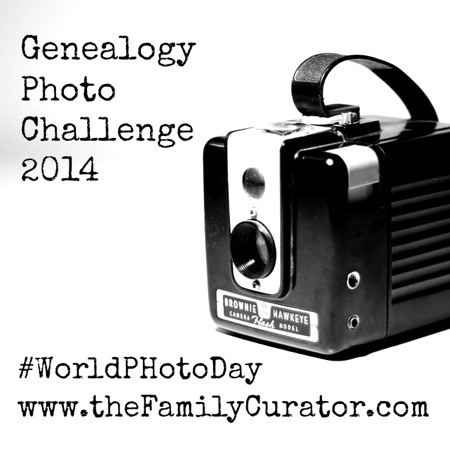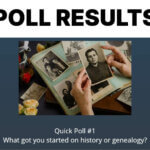Hello end of January. Can you believe it? It has been such a busy month that it has simply flown by. Anyway during the past month I’ve read a whole heap of great blog posts and articles, a number of which I ‘m sharing with you here.
In this edition of Inspiring Genealogy Blogs we cover: boring ancestors, books and copyright, photos and copyright, passing on heirlooms, genealogy habits, as well as goals, DNA tests, oral history traditions, tips for a photo scanning project, suggestions from an archivist and more!
So get comfy, grab a nice cool drink (or a hot one if you’re in the northern hemisphere where it’s currently so ridiculously cold) and enjoy some great reads.
As I mention every time, I find that reading blog posts helps me keep up with the latest news, products as well as what’s happening in general in the world of genealogy. And if you happen to already follow me on Facebook and Twitter, you already know that I like to share with you the interesting things I read.
Books, Ownership, and Copyright
James Tanner writes on another fascinating topic ‘Books, Ownership and Copyright’. He writes “Let’s suppose that as a genealogist you learn about a book written by one of your relatives about your family. You try to contact your relative but find out that she is dead. You try and find a copy of the book and are surprised to learn that she only printed a dozen or so copies and all of those were given to her children and immediate family members. After a great deal of effort, you finally locate a copy of the book that you can borrow from one of the relatives who received the book from the author. Can you make a copy of the entire book? Who could give you permission to make such a copy, i.e. who owns the copyright to the book if there is one? Could you upload a copy of the book online on one of the major genealogical websites so others can have access to the book?” Read the full article …
Heirloom Handoff: How to Handle Family Treasures
Many young adults don’t want their parent’s old furniture, and they don’t want anything traditional. So whether you’re planning the distribution of your own treasures, of you’re dealing with a lifetime’s worth of a loved one’s stuff, you want to avoid burdening the family. Author of this article, Denise Levenick gives readers three routes for you to consider. Read the full article …
One-third of Americans can’t name all of their grandparents
This article states that “A third of Americans are unable to name all four of their grandparents, according to new research. From knowing names of family members, tracing their family tree or knowing when their family came to America, the survey of 2,000 Americans found that many are clueless when it comes to their heritage.” I would think that Australia isn’t far behind, excluding those who have genealogists in the family of course. For further interesting statistics read the full article …
Making Good Genealogy Habits
While many people make New Year’s resolutions, Amy Johnson Crow suggestion don’t make a resolution, but make a new habits instead. She says “Improvement in any area often comes down to improving habits. That includes our genealogy research. Better genealogy habits makes for better research. Here are five habits that will help improve your genealogy.” Read the full article …
50 Tips for Genealogy Goal-Setting
Following on from the previous article about making good habits, why not include some goals in the mix. Here is a list of 50. Pick a few, write a date next to them, and aim for your goal. Once you’ve accomplished those, pick a few more. Read the full article …
Why DNA Tests Are No Substitute For Genealogical Research
Lynn from the Trentino Genealogy blog covers a topic that is very relevant for current day researchers, and that is that DNA testing DOES NOT replace regular research, but rather she shows how they can be used together. She writes “in this article, we will examine some of the misconceptions people have about DNA tests, how relationship estimates are formed to identify ‘DNA Matches’, and the many the challenges around identifying your connections with DNA matches. We’ll also look at the technique of ‘triangulation’, as well as how ‘endogamy’ can sometimes blur relationship estimates.” Read the full article …
Boring Ancestors
The title of this one grabbed me, as we all know that there is no such this as a boring ancestor. But Chris Paton writes ‘How many times have we come across an ancestor who appears to have been the most boring person on Earth?! “His name was John Smith” or “he was only an agricultural labourer” are for many people war cries to signpost that it is time to hand in the genealogical trowel on a particular line. We may be keen to dismiss our ancestors very easily when nothing obvious appears to stand out about them, but a ‘boring’ ancestor may be one simply badly recorded to posterity, or whose records have not survived to the modern day.’ Read the full article …
Start an Oral History Tradition
Although not a new post, it was a new-to-me one, and with all the holiday season that we’ve just it’s timely too. As author Tami Koenig writes that all “ family traditions have start somewhere” One of her suggestions is to set aside an hour or two every Thanksgiving, Christmas or Memorial Day or whenever your whole family gathers together – to record the stories of your senior family members? For more advice and tips on how to do this read the full article …
11 Tips for Anyone Starting a Photo Scanning Project
If you are you considering a photo scanning project and don’t know where to begin? This is for you. With advice of file format, file naming, recording notes as you go, cataloguing them in software, and a bunch more. Read the full article …
Genealogy Photos and Copyrights
“It’s online, so I can copy it … right?” Wrong. Well … actually, it depends. Take a read of this easy to understand post on photos (old and new), and the the do’s and don’t for copying them. Read the full article …
How Can You Help An Archivist to Help You? Reference Service From Our Side of the Desk
This is a fabulous article from the Peel Archives blog, written from an archivists perspective. They really do want to help us, but there’s thing we can do, for them to help us better. Does that make sense? They write … “There are some great guides out there for researchers planning to visit an archives (we’ve linked to some below). But in this post, we’d also like to reveal a little of what reference is like from our side of the desk. We hope that this will help you save time and avoid unnecessary frustration: if you know why things are the way they are, you can help us to help you.” Read the full article …
Happy reading!!










